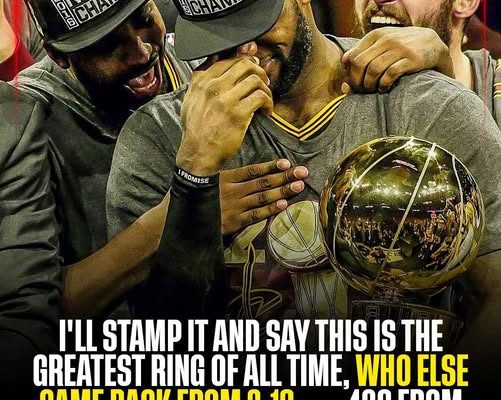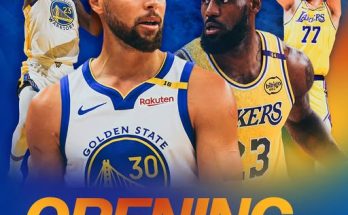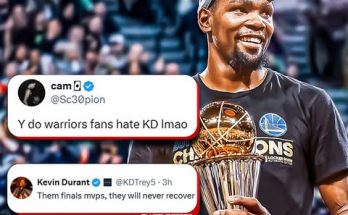Lonzo Ball has never been one to shy away from bold statements, but his latest declaration has sparked a wave of discussion across the basketball world. In a recent interview, the Chicago Bulls guard confidently stated that he believes the Cleveland Cavaliers’ 2016 NBA championship is the greatest in league history, a sentiment that both resonates deeply with some fans and draws skepticism from others. For Lonzo, the magic of that moment went beyond just the numbers or the trophy—it was about the circumstances, the improbable nature of the comeback, and the historical significance of what the Cavs accomplished against a Golden State Warriors team that was being hailed as one of the greatest ever assembled. His assertion has reignited debates over which title reigns supreme in the annals of NBA lore, but there is no denying that the 2016 Finals was a moment unlike any other in the sport’s history.
To understand why Lonzo is so adamant about this viewpoint, one must revisit the context of that series. The Cavaliers were up against a Warriors squad that had just completed a record-breaking 73–9 regular season, shattering the 1995–96 Chicago Bulls’ previous best mark of 72–10. Golden State was not only talented, led by two-time MVP Stephen Curry, but also deep, disciplined, and historically dominant. They were coming off a championship the year before and were widely expected to repeat, if not in a clean sweep, then in a comfortable series win. When the Warriors raced out to a 3–1 series lead in the Finals, the basketball world felt it was simply a formality before they were crowned again. No team had ever come back from a 3–1 deficit in the NBA Finals, and the Warriors had home-court advantage with two of the last three games to be played at Oracle Arena, a place where they almost never lost.
It is in this backdrop of overwhelming odds that Lonzo Ball sees the beauty of the Cavaliers’ triumph. LeBron James, facing the weight of delivering on his promise to bring a championship to Cleveland, turned in one of the most dominant stretches of basketball in NBA history. Alongside him, Kyrie Irving showcased his own brilliance, delivering clutch shot after clutch shot, none bigger than the iconic three-pointer over Stephen Curry in Game 7 that would help seal the victory. The Cavs didn’t just play well—they elevated their game to a level that matched the stakes and defied every projection. For Lonzo, this is the essence of greatness in sports: not just winning, but doing so when the odds are stacked so heavily against you.
The momentum shift in the series is still one of the most talked-about turnarounds in sports. In Game 5, with Draymond Green suspended for an accumulation of flagrant fouls, LeBron and Kyrie each scored 41 points on the road, sending the series back to Cleveland for Game 6. LeBron followed that performance with another 41-point masterpiece at home, forcing a Game 7 that would be decided on the Warriors’ home floor. In that decisive contest, every possession mattered, and the pressure was immense. LeBron’s legendary chase-down block on Andre Iguodala late in the fourth quarter has since been immortalized as one of the defining plays in NBA history. Combined with Kyrie’s dagger three and Kevin Love’s surprising defensive stop on Curry in the closing moments, the Cavaliers cemented a victory that was equal parts skill, heart, and destiny.
Lonzo Ball’s appreciation for this moment also seems tied to his own understanding of the game as a player who values team chemistry, resilience, and mental toughness. Having battled through his own injuries and setbacks in his career, Lonzo knows firsthand how difficult it is to overcome adversity at the highest level. The Cavaliers didn’t just need talent to win—they needed unity, belief, and perfect execution over three straight elimination games against a historically great opponent. For him, that combination of adversity, historical context, and sheer willpower makes the 2016 Cavaliers’ title the gold standard for NBA championships.
While there are many other titles that fans and historians might argue deserve the “greatest ever” tag—Michael Jordan’s first championship with the Bulls in 1991, the 1977 Portland Trail Blazers’ underdog run, the 1980 Lakers’ “Magic Game” in which rookie Magic Johnson filled in at center for an injured Kareem Abdul-Jabbar—Lonzo’s choice reflects how powerful the narrative of the 2016 Finals was. It was a story with larger-than-life characters, dramatic swings in momentum, and a payoff that seemed almost scripted for maximum drama. In many ways, it was basketball theater at its finest, and that resonates with fans even years later.
The emotional element cannot be understated either. For Cleveland, a city that had endured decades without a major sports championship, this victory was more than just an NBA title—it was a cathartic moment of civic pride. The “Believeland” story was punctuated by the image of LeBron James collapsing to the floor, overcome with emotion as the final buzzer sounded. This was not just about beating the Warriors; it was about ending a city’s sports curse, redeeming past failures, and fulfilling a promise. Lonzo Ball, who grew up in a sports-loving family and understands how championships can shape a community’s identity, clearly appreciates that dimension of the win.
Even with the passage of time, the 2016 Finals continues to spark discussion and analysis. Advanced stats show just how exceptional LeBron was in that series—leading all players in points, rebounds, assists, steals, and blocks over the seven games, something no other player has ever done in any playoff series, let alone the Finals. That unprecedented dominance further fuels Lonzo’s argument that this was the pinnacle of basketball achievement. It was the perfect storm of individual greatness, team resilience, and historical improbability.
Of course, not everyone agrees with Lonzo’s assessment. Critics point out that the Warriors were shorthanded with Green’s suspension and that Curry was nursing injuries, factors that might have tilted the series. Others argue that greatness in championships should be measured over the course of the entire season, and in that sense, the Warriors’ regular season dominance coupled with their playoff performance leading up to the Finals still makes their 2015 title or even other dynastic wins more impressive. But even these dissenting voices often concede that the drama and narrative of the 2016 Finals are unparalleled.
For Lonzo Ball, the beauty of sports lies in these kinds of debates. He knows that calling one championship the greatest in history is subjective and bound to stir controversy, but that’s part of the fun. In making his case for the Cavaliers’ 2016 triumph, he’s not just recalling a basketball series—he’s honoring a moment that embodied everything he believes is great about the game: skill, heart, resilience, and the ability to defy the impossible.
In the years since that victory, the legacies of the players involved have continued to evolve. LeBron James added another title in 2020 with the Lakers, further cementing his place in the GOAT conversation. The Warriors regrouped, added Kevin Durant, and went on to win two straight championships in dominant fashion, solidifying their own dynasty. Kyrie Irving’s career took unpredictable turns, while Kevin Love transitioned into more of a veteran role before eventually leaving Cleveland. Yet, no matter what came after, that 2016 win remains frozen in time as a singular achievement that will forever be etched in NBA history.
Lonzo’s endorsement of that championship is not just about the outcome—it’s about the journey. It’s about a team that was written off, a superstar who shouldered the hopes of an entire city, and a comeback that defied all odds. Whether or not one agrees that it is the greatest championship in NBA history, it is undeniable that the 2016 Cavaliers’ run represents the very essence of why fans watch sports: to witness the impossible become reality. Lonzo Ball’s declaration ensures that this debate, like the memory of that series, will remain alive and passionate for years to come, as future generations revisit that magical season and perhaps see what he sees—a team that climbed the highest mountain when the path seemed impassable and left a legacy that still inspires players and fans alike.



